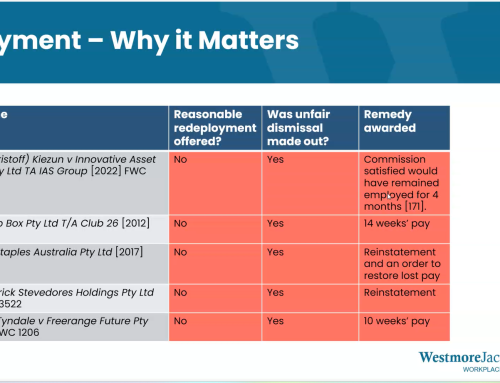Following the Full Court of the Federal Court’s decision in WorkPac v Skene, the federal government came under pressure to address unfairness which can arise as a result of that decision.
On 18 December 2018, the Fair Work Amendment (Casual Loading Offset) Regulations 2018 (“Regulation”) took effect. This Regulation was created to address the effects of the WorkPac decision which was handed down in August last year.
The Regulation seeks to make clear that in certain circumstances, an employer can argue that a court should take account of any casual loading paid to an employee who is claiming payment in lieu of entitlements payable to a permanent employee.
Why Was this Regulation Made?
WorkPac, in effect, held that just because an employee was engaged as a casual and paid as a casual, does not necessarily mean that employee is, in fact, casual.
This meant that an employee could be entitled to National Employment Standards (“NES”) entitlements which casual employees are not entitled to receive, such as paid annual leave and personal leave, notwithstanding the fact that the employee was paid a casual loading.
Following the WorkPac decision, the federal government came under pressure to address this issue.
What Does the Regulation Do?
The Regulation seeks to address the unfairness which can arise from the WorkPac decision.
Under the Regulation, if:
- a person (“employee”) is employed by an employer on the basis that they are a casual employee; and
- the employer has paid the employee an amount that is clearly identifiable as an amount paid to compensate the person for not having a NES entitlement which casual employees do not receive (“casual loading”); and
- during some, or all, of the employee’s employment they were, in fact, a permanent employee (and therefore entitled to NES entitlements that casual employees do not receive); and
- the employee has made a claim to be paid in lieu of those NES entitlements,
the employer may make a claim to have the casual loading taken into account by the court when determining the amount payable to the employee in lieu of certain NES entitlements, such as annual leave.
This Regulation increases the likelihood that employers who have paid casual loadings to employees who are, in fact, permanent employees will be able to “set-off” that casual loading against any payments in lieu of certain NES entitlements (such as annual and personal leave).
This Regulation has retrospective effect. In addition to future periods of employment, the Regulation applies to periods of employment prior to its commencement on 18 December 2018.
How Far Does the Regulation Go?
The Regulation is not a cure-all. It only provides employers the ability to set-off casual loadings against claims for payment in lieu of relevant NES entitlements.
At face value, this means the Regulation does not limit the ability of a currently-employed permanent employee, who has been paid a casual loading, to claim they are entitled to take annual leave.
Additionally, this leaves open a possible loop-hole for permanent employees who have been paid a casual loading who are not currently employed. These employees may seek an order for reinstatement so they can take annual leave.
Importantly, employers who draft their employment contracts imprecisely may find it more difficult to make use of the Regulation.
However, the Regulation does not limit other arguments an employer may make to defend themselves from claims made by employees in these situations. This leaves room for employers to set up alternative arguments which could improve their legal position in the event a permanent employee who has been paid a casual loading makes an underpayments claim.
What Next?
It will be interesting to see how WorkPac will continue its court proceedings against another of its employees, following the creation of this Regulation.
WorkPac is seeking a declaration that this employee was at all times a casual employee. WorkPac is also arguing that if the employee was permanent, it can reduce the amount of annual leave payable to the employee because it had previously paid that employee a casual loading.
If these proceedings continue to a court decision, it is likely that decision will give additional guidance as to the scope and future applicability of the WorkPac decision.
This remains a fast-developing area of workplace law.
Adam Colquhoun
Principal, WestmoreJacobs
This article is general information only. It is not legal advice. If you need legal advice, please contact us.






